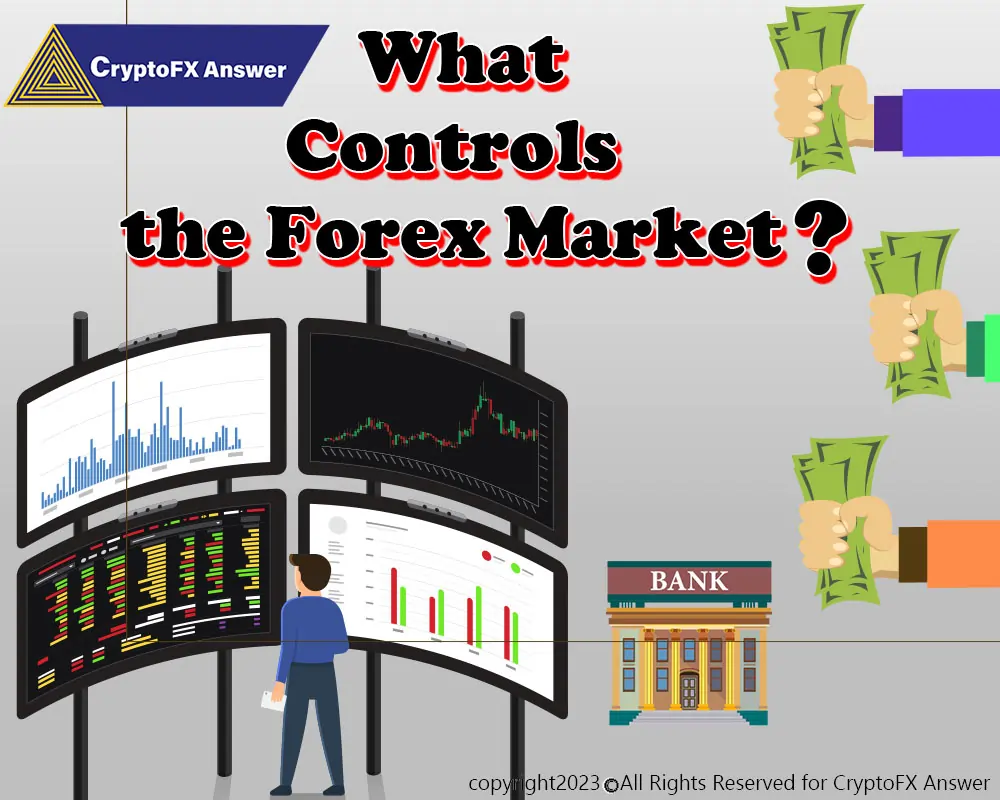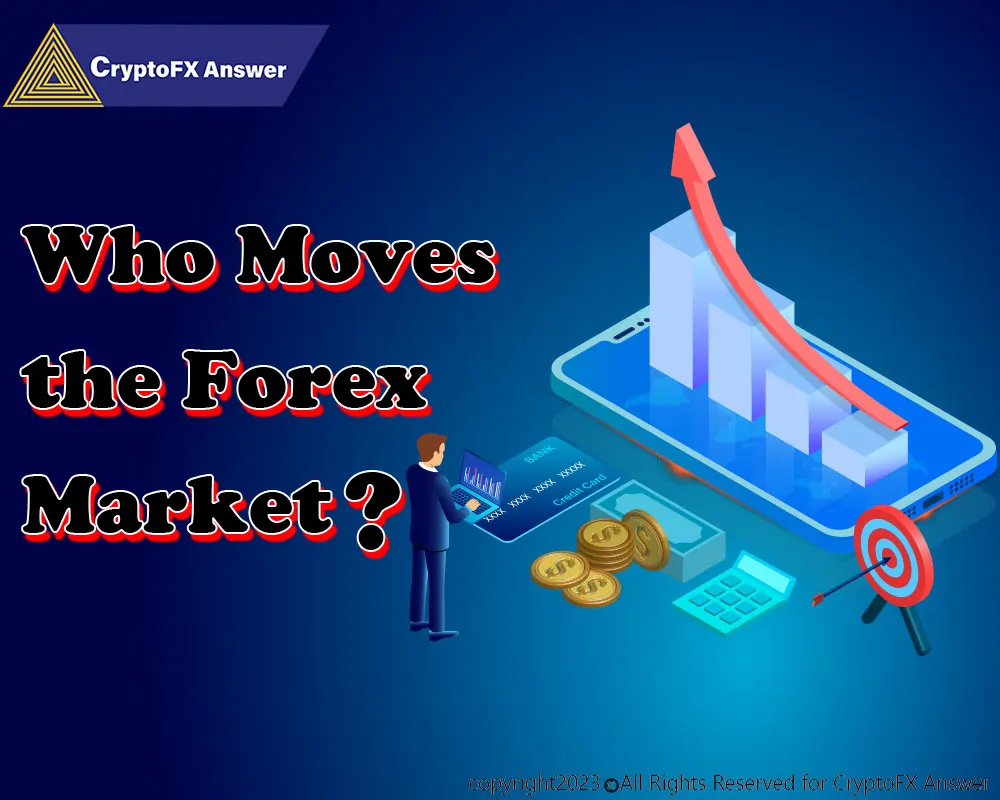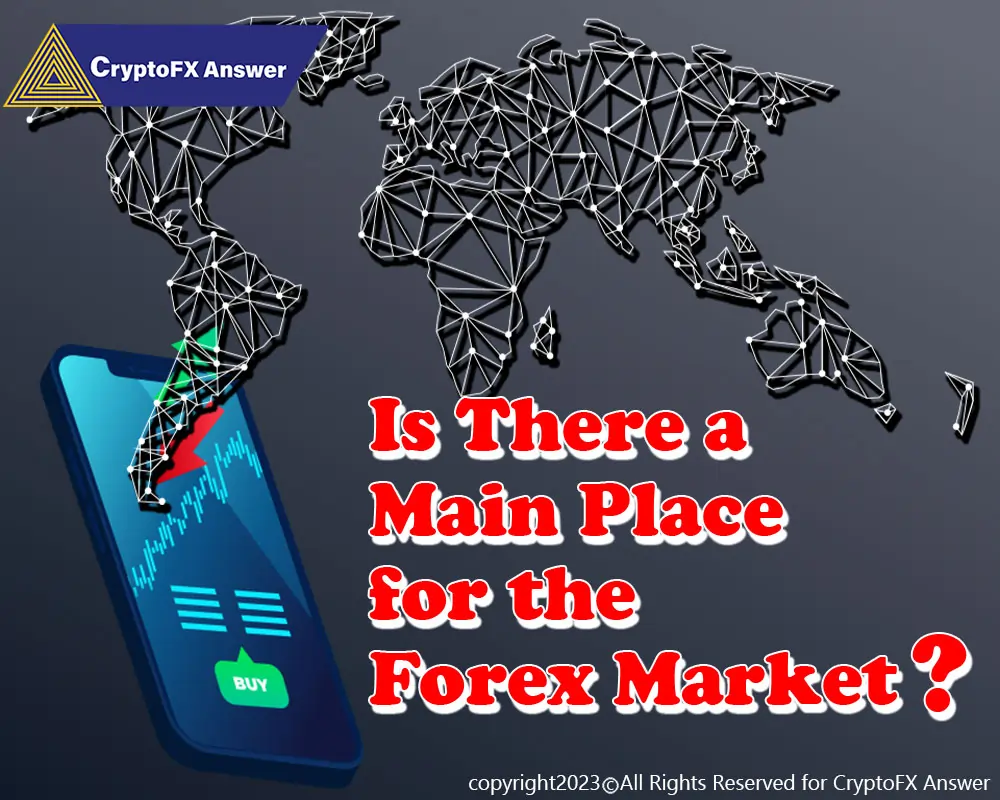Who controls the forex market in the world? The foreign exchange market, also known as the Forex or F.X. market, is a dynamic and multifaceted environment, which is better to say market, where trillions of caches are exchanged daily.
This newly arose market facilitates the action of buying and selling currencies between international banks, institutions, and individuals.
But there comes a mysterious question! Who, exactly, controls this vast network of currency transactions? In other words, who or what controls the forex market?
Forex has become a global financial hub where currencies are traded. Have you ever wondered who controls the forex market and who pulls the strings behind this complex web of currency exchange?
Let’s unravel the mysterious question and explore who moves the Forex market.
What Controls the Forex Market?
To be honest, the Forex exchange market is not controlled by individuals or specific organizations. The foreign exchange market is decentralized as it is controlled by several local offices or authorities rather than one single one.
Forex market is an organization of individuals consisting of international banks, central banks, businesses, hedge funds, and each trader that is trading in the market.

In general, the F.X. market is of such a vast magnitude that control by a single participant is implausible. If, for instance, a hedge fund were to decide to purchase $1 billion worth of EUR/USD at the market price, it would likely result in a surge in the currency pair.
Nevertheless, the impact of this transaction would be fleeting, given that this currency pair is among the most frequently traded.
Moreover, market participants find it unfavorable to manipulate the market in such a manner because it not only hinders their performance but also exposes their actions.
It is significantly more convenient for a hedge fund to maintain the secrecy of a substantial F.X. position if it is accumulated gradually, as opposed to executing a massive trade all at once.
Now, let’s go deeper and examine each option that we know controls the Forex market.
Who Moves the Forex Market?
Before focusing on who moves the foreign exchange market, let’s briefly explain that the Forex market functions on an independent basis 24 hours a day.
Unlike traditional stock exchanges, Forex is based on an electronic network of banks, financial institutions, and individual traders. Key actors who shape and control the F.X. market dynamics are crucial to this chain.
1. Central Banks & Governments Control the Forex Market.
Central banks play an essential role in controlling the Forex market. These organizations, such as the Federal Reserve in the U.S. or the European Central Bank, affect and kind of control the currency values through monetary policy.
Interest rate decisions and interventions in currency markets are tools they use to control, move, stabilize, or stimulate their economies.
2. Commercial Banks also move the Forex.
Commercial banks facilitate Forex transactions for businesses, individuals, and other financial institutions. This is the reason they are considered as a F.X. market controller.
They act as mediators and contribute to market liquidity. Large banks, commonly referred to as “market makers,” also play a significant role by providing bid and ask prices, ensuring smooth trading.
3. Real money also controls the Forex Market.
Investment funds avoid using borrowed money, which is why they’re called ‘real money.’ These funds handle big amounts of money and turn to the forex market when dealing with foreign investments.
For instance, if they want to buy a bunch of U.K. stocks on the London Stock Exchange, they need to get the local currency, like the Pound Sterling.

4. Investment Partnership
Hedge funds, investment firms, and other institutional investors participate actively in the Forex market and control this market.
Their significant trading volumes can impact and move currency values, especially when they collectively move in a certain direction. Market sentiment, geopolitical events, and economic indicators guide their trading decisions.
5. Retail Traders
Individual traders, sometimes known as retail traders, are another influential component in the foreign exchange market. Anyone with access to the internet may take part now, all because of technical improvements.
The aggregate activities of retail traders can impact market patterns, even when their deals don’t seem to amount to much when contrasted with established quantities. To rephrase, the Farex may be moved by retail traders.
6. Prime & retail brokers can move the Forex Market.
Companies providing liquidity, leverage, and support services to other market players. Big banks often have operations called prime brokerage, but some non-bank firms also do this work.
Usually, prime brokers work with other big players in the market, like institutions, but sometimes, an individual trader can also use their services if they meet the broker’s requirements.
Firms that help regular people trade in the F.X. market. They can be market makers, STP brokers, or ECNs. Market makers take the other side of all the trades from clients and essentially act as dealers, not brokers.
STP (straight-through-processing) brokers send most or all orders directly to the market, while ECNs allow you to trade with various other people in the market, and the broker doesn’t have any conflict of interest.
7. Market Manipulation & regulation, too, control the F.X. market, unfortunately!
What controls the forex market? We said that the F.X. market has a decentralized nature, but it does not mean that it is immune to manipulation. Sad but true!
Traders have to be careful of fraudulent activities and scams. Regulatory bodies and groups like the Commodity Futures Trading Commission (CFTC) in the U.S. and the Financial Conduct Authority (FCA) in the U.K. work to keep the market fair and safe for traders.
Important note: The Impact of Global Events on the FX Market
The Forex market can be affected by global events and economic developments. Political instability, economic crises, and natural disasters can significantly impact currency prices. This can be the other alternative that can control the foreign exchange market.
So, whenever a new trader asks you who are the forex market makers? You can name these 4 organizations and individuals. But do you know where is the main location of the F.X. market?
Is There a Main Place for the Forex Market?
Caroline Banton, who’s been writing about business and finance for over 6 years, explains that the forex (F.X.) market doesn’t have a single central location.
Instead, trading in this market happens worldwide, around the clock, and through various methods. Wherever one currency is swapped for another, forex transactions occur in different ways and different parts of the world.

For further exploration, dive into our article on “Why Forex Is Better Than Crypto?“, which expands on this topic.
Conclusion
The Forex market is a complex and ever-evolving exchange market, with no single unit holding ultimate control. In other words, F.X. is not controlled by one person or one specific organization.
However, as mentioned in this article, central banks, commercial banks, hedge funds, and individual traders play a role in shaping currency prices, driving market trends, and moving the forex market.
Suppose you, as a trader, understand these key participants and the factors that influence them. In that case, this can be essential for you who are interested in participating in this dynamic global market.
If you’re interested in learning more about the Forex market and how to navigate its complexities, consider exploring our articles on this website.
If you have any ideas about “Who Controls the Forex Market?” please mention them in the comments below.

![who-controls-forex-market Who Controls the Forex Market? [FX Market Participants]](https://cryptofxanswer.com/wp-content/uploads/2025/01/who-controls-forex-market-696x557.webp)